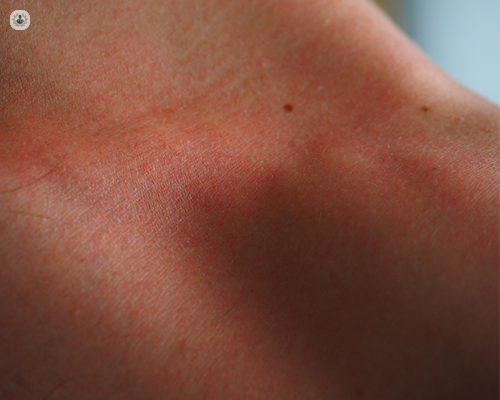How is rosacea treated?
Written in association with:Here, esteemed consultant dermatologist, Dr Iaisha Ali, explains what rosacea is, what causes it, and how the skin condition can be effectively managed and treated.

What is rosacea?
Rosacea is a chronic and inflammatory skin condition that primarily affects the face, causing redness, visible blood vessels, swelling, and sometimes, small red bumps resembling acne. While rosacea can occur in individuals of any age, it is most commonly diagnosed in adults between the ages of 30 and 50, particularly those with fair skin and a tendency to flush or blush easily.
What causes rosacea?
The exact cause of rosacea is not fully understood, but it is believed to involve a combination of genetic, environmental, and vascular factors. Triggers such as sun exposure, hot or spicy foods, alcohol, stress, and certain skincare products can exacerbate symptoms and lead to flare-ups of rosacea.
Rosacea is typically classified into four subtypes, each with its own characteristic symptoms:
- Erythematotelangiectatic rosacea: Characterised by persistent facial redness, flushing, and visible blood vessels.
- Papulopustular rosacea: Characterised by redness, swelling, and acne-like breakouts (papules and pustules) on the central face.
- Phymatous rosacea: Characterised by thickening and enlargement of the skin, particularly on the nose (rhinophyma), resulting in a bulbous or irregular appearance.
- Ocular rosacea: Affecting the eyes, causing redness, dryness, itching, burning, and sensitivity to light.
How is it diagnosed?
Diagnosing rosacea typically involves a thorough medical history, physical examination, and evaluation of symptoms. There is no cure for rosacea, but treatment options are available to help manage symptoms and reduce the frequency and severity of flare-ups.
How is rosacea treated?
Treatment for rosacea may include topical medications (such as metronidazole, azelaic acid, or brimonidine) to reduce redness and inflammation, oral antibiotics (such as doxycycline or minocycline) to control bacterial overgrowth and inflammation, and topical or oral medications to relieve symptoms of ocular rosacea.
To book an appointment with Dr Iaisha Ali today, simply visit her Top Doctors profile.


